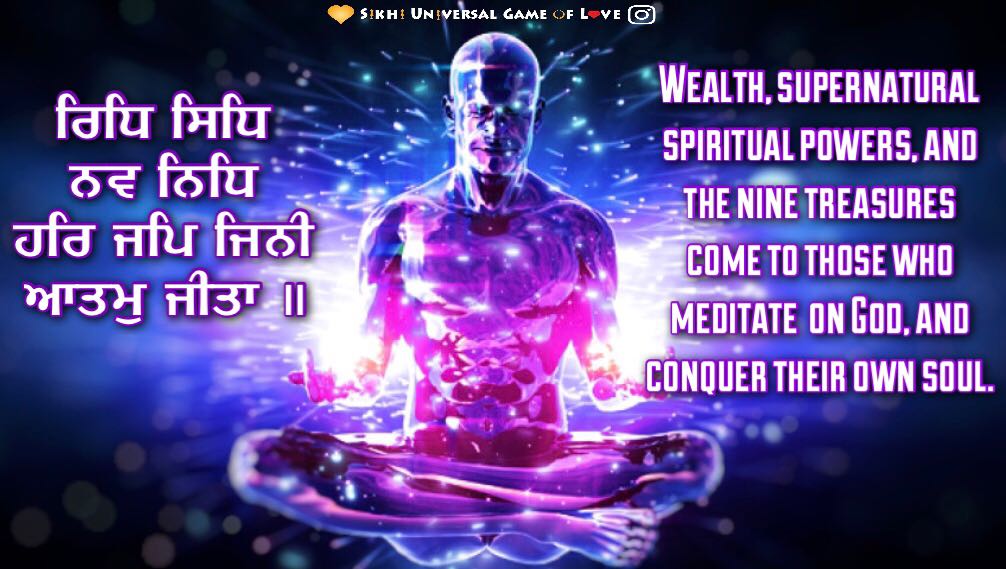BHAI VEER SINGH JI, ON NAAM MEDITATION!
Bhai Veer SIngh’s Ji delved deeper and deeper into the spiritual teachings of our Guru. Below, listed are a compilation of points espoused by Bhai Sahib on the very heartbeat of Sikhi – Naam Simran.
1. Vaheguroo is the Gurmantar, by doing it’s Simran (rememberance), EVERYTHING is possible and can be achieved.
2. Simran is not an empty practice. It is the Game of Love. Naam must be recited by ones self as if they, who until eating food, cannot be satisfied. Simran is to be recited by ones tongue, which gradually reaches one’s heart. A Naam ‘Abhiyasi’ (practitioner) must have great patience and humility.
3. With Simran, the mind first eliminates its dirt and the one who practices Simran shows self-control from bad deeds.
4. By churning on “Vaheguroo, Vaheguroo” one’s mind is affected from every angle. The mind becomes more soft and gentle. It can distinguish between right and wrong and can avoid vices and evil.
5. In the initial stages, Simran eliminates the mind’s dirt. So, at first it is difficult to concentrate. Once the dirt and filth are removed it becomes much easier to concentrate. Once the mind becomes pure one begins to enjoy the sweetness of Simran and does not want to stop doing it.
6. Do not worry if your mind doesn’t focus. You must continue focusing on repeating Naam through the day. Whilst enjoying Naam if the mind focuses even a little bit, that is not a small thing. The mind achieves complete control only through Vaheguroo’s blessing.
7. Whether your mind is able to concentrate or not, continue to meditate on Naam. Those who remained firm will one day achieve complete concentration. Those who continue in this journey, however slowly, will reach their destination.
8. Getting to taste the sweetness of Naam is in Guru Ji’s hands. A Sikh’s duty is to devote and worship. He does not hold the right for it to bear fruit. Guru Ji occasionally will deliver a glimpse of the wondrous lord so that their Sikh does not falter.
9. Naam eliminates sin and pain. Simran even cures the body and takes us closer to God. It allows us to see within ourselves.
10. Those who take Naam should remain humble. Naam is a blessing and gift from Vaheguroo. If we repeat Naam with this in mind it will keep us humble. The Naami One has power in his Ardas. When Vaheguroo’s blessings begin to shower on this Sikh, they should beware. People may try to use and exploit them. This can also affect their connection with Naam.
11. As one continues in meditation on Naam one attains great physical powers. One must avoid exhibiting these powers as they create great ego. As ego enters the mind, connection with Naam breaks.
12. One who has physical powers is not great. Greater is the one who lives continually in the joy of Naam and for whom Naam has become the foundation of life.
13. After saying “Vaheguroo” once, if one feels like saying “Vaheguroo” again, then consider that Simran is working on the mind and the filth is being removed.
14. After saying “Vaheguroo” once, if one feels like saying “Vaheguroo” again, then thank Vaheguroo four times, that he has blessed you with Naam and that you have so much love for Naam.
15. Meditation on Naam is a great gift and is attained with the blessings of Vaheguroo. When you say “Vaheguroo” then also thank Vaheguroo again, who blessed you with this gift.
16. When your consciousness reaches its complete blissful state one should not feel proud but understand it as Vaheguroo’s compassion. Some people become arrogant in this state and this disrupts their spiritual journey. Arrogance and pride must always be avoided.
17. With the practice of Simran you are gaining on your spiritual journey. These are some signs of progress:
After saying “Vaheguroo” once, you feel like saying “Vaheguroo” again
Your faith in Naam increases day by day.
Influence of your vices will decrease.
You feel peace and quiet in seclusion.
18. Always remember Naam is the only thing you will take with you in the end. So, do meditate on Naam until your last breath.
Guru Nanak Dev Ji Says, "bin naam preet piaar naahee vaseh saach suheleeaa || sach man sajan sa(n)tokh melaa guramatee sahu jaaniaa"
Without Naam, the Name of the Lord, there is no love and affection; but with her True Lord, she abides in peace. Through mental truth and contentment, union with the True Friend is attained; through the Guru's Teachings, the Husband Lord is known.
Vaheguroo!



